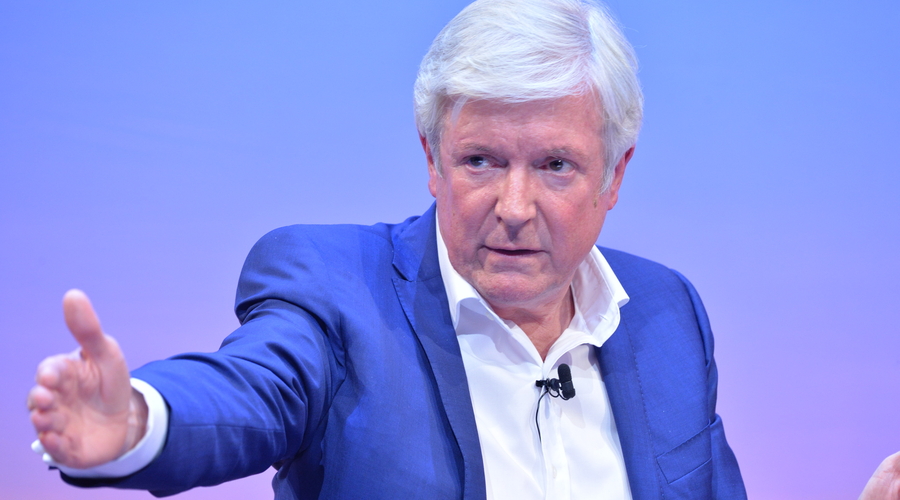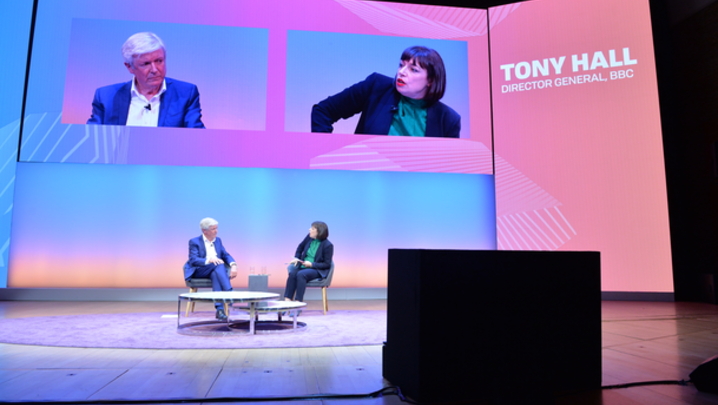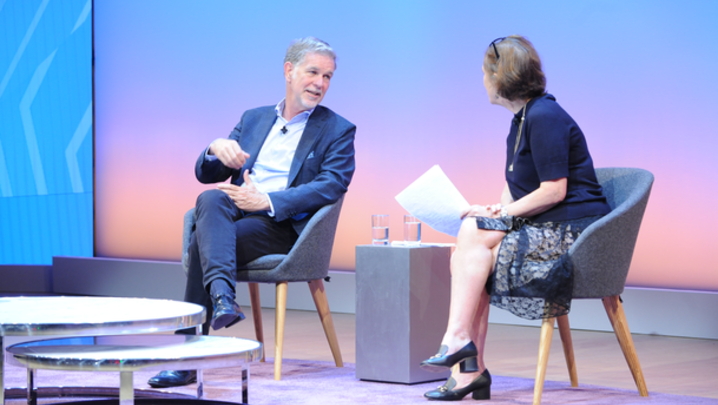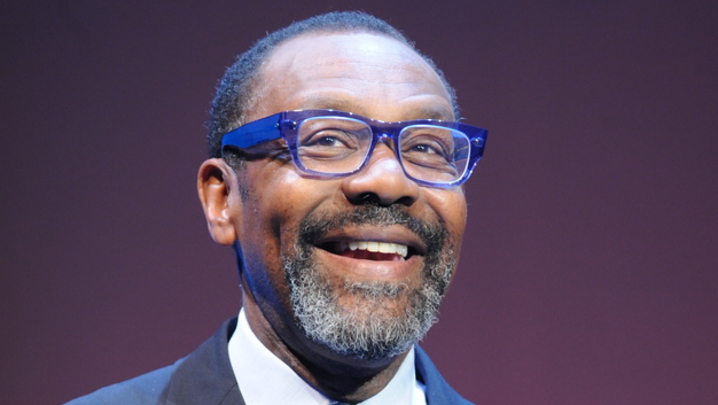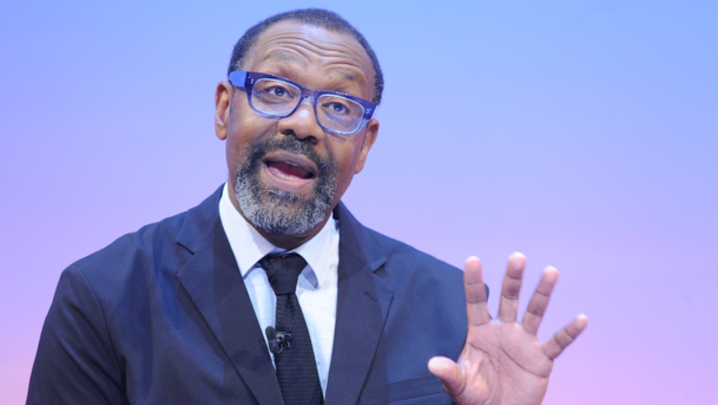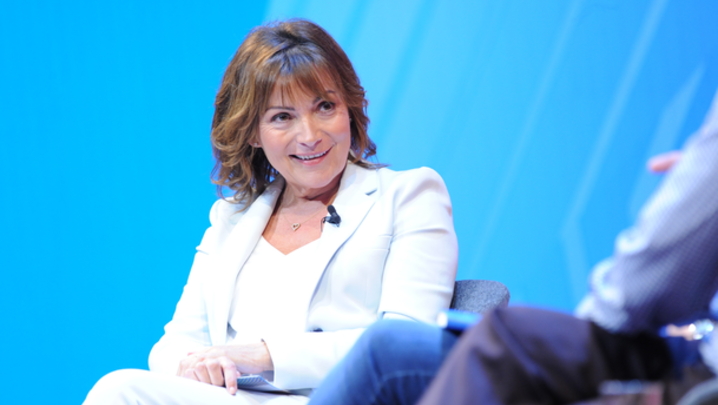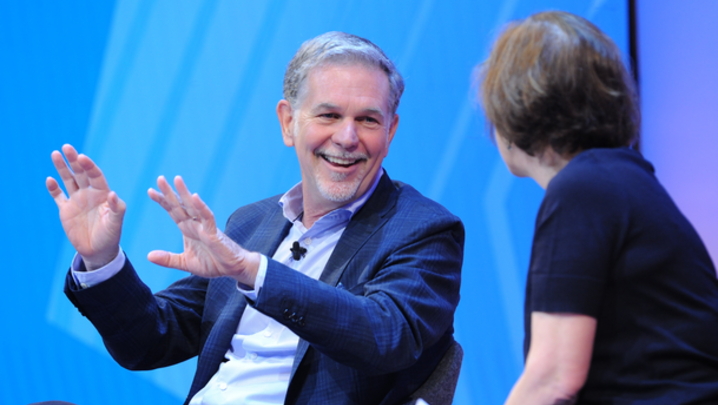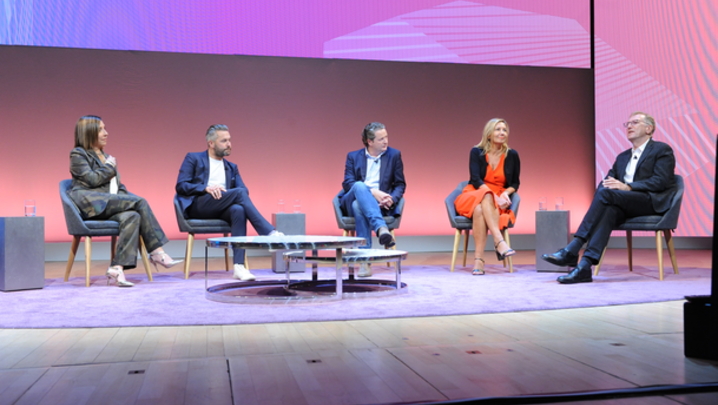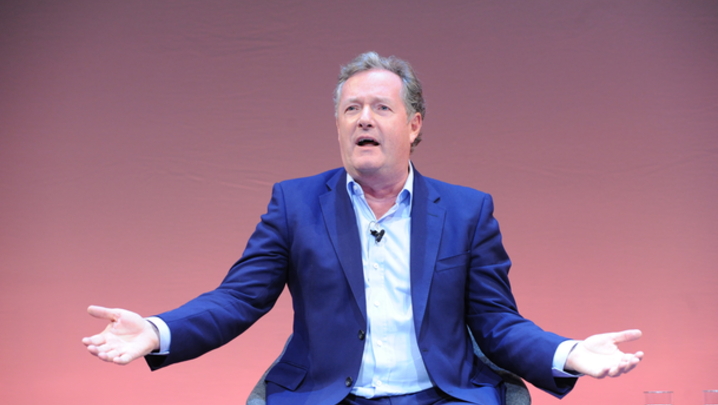BBC's Director-General Tony Hall delivers his keynote speech at the RTS Cambridge Convention 2019.
Check against delivery.
First I want to take us back 40 years. A time before we learned words like ‘value chain’, ‘strategic reprioritisation’, ‘disintermediation’, or indeed ‘backstop’.
40 years ago, in the late seventies, the renowned Harvard economist JK Galbraith published his masterpiece The Age Of Uncertainty. In it he argued that the economic and political certainties of a previous century had begun to dissolve. Financial crises, monetary shocks, the threat of conflict and the collapse of international trade were ushering in an era of change, unpredictability and revolution. In Britain, this was the era of the three day working week - and bailouts from the International Monetary Fund. In the US, it was the age of Watergate.
Galbraith expanded on his ideas in a 15-part BBC series, first broadcast in 1977. It caused a row - and there were those who condemned the BBC for bias. Of course it’s very much of its time. But it still resonates powerfully today.
Because at this moment, it feels like we are navigating our way through a new age of uncertainty. Not with the benefit of hindsight. Not comfortably through the rear-view mirror. But in real time. At full throttle. With the windscreen painted over.
Our country is at a pivotal moment in its history, as it reshapes its relationship with the world. Conventions and traditions we have held to are being broken. Our highly open, globalised economy is facing trade wars. New technology is changing - or you might call it disrupting - our world at an accelerating pace. Old alliances and common values are under strain. Propaganda and disinformation are rife.
It can sometimes feel like an even earlier era of uncertainty - that of the 1920s. That, of course, is the era that created the BBC. We exist as a response to that time of change. There was conflict, but there was opportunity too.
We were set up to use the power of the new, mass media to shape culture and society for the better. To find a uniquely British way between the free market of the American media, and the state control of the Russian. We were there to bring the magic of broadcasting to all, the sower casting the seeds of virtue, to take root wherever they may.
The BBC played an essential role in addressing many of the issues back then. And, I believe, the same is true today. In an age of uncertainty we should be confident. An age of uncertainty is also an age of opportunity.
For our audiences, the British media, the BBC and public service broadcasting are more important than ever. And let me say why.
In an age of disinformation, propaganda and fakery, people want access to truth. To trusted, accurate news, at a time when the whole idea of trust and truth has never been more contested. When the false prophets of certainty want to feed us easy answers, our job is to reflect our age of uncertainty as it is. Being honest about what we don’t know, and acknowledging that we’re uncertain too.
Audiences also want story telling that reflects their lives… and their uncertainties. If you look at the appeal of a series like Fleabag, it’s all about people saying it’s hard, I’m uncertain, I’m doing my best, and I’m trying to be who I think I could be. Perhaps that’s why people relate to it. And, for me, hot priests aside, Phoebe’s series was brilliant at capturing the ambiguities of relationships, love and commitment today.
But there’s a bigger picture here too. If - going forward - we get our story-telling right, and harness the power and potential of British creativity, then we can help ensure that the UK is well placed to take a lead in the next economic revolution.
Why?
Because creativity, innovation and imagination - intangibles in the old accounting phrase - are new sources of value in the future. Across all parts of the economy, in all parts of the world, companies are creating huge businesses from assets that you can neither see nor touch, in formats, design, branding, R&D, data, and software. These intangibles are increasingly the source of long-term success for companies - and countries - alike.
The UK has a huge advantage here. We are one of the world’s most creative digital players. We have the power and potential to own and exploit an abundance of intellectual property.
It’s not as if we don’t have the talent. We’ve always had it. I remember a few years ago chairing a panel to pick 60 New Elizabethans. What struck me was that the largest category by far were artists, playwrights, musicians, architects and more - basically people who led the field in terms of ideas and creativity.
And, of course, at this moment, showcasing all this to the world is even more important. Right now, our country needs to amplify its voice, and the BBC is one of the key ways for the UK to do just that.
We need the BBC and public service broadcasting. We are one of the UK’s most recognised brands.
But being needed more than ever is not enough in itself. The world is littered with the remains of organisations whose ideas mattered, but who failed to adapt.
The lessons of history are clear. Today, I want to set out the key areas where the BBC will change to rise to this opportunity.
We will be saying more about each of these over the coming months. But here’s a flavour of what’s to come.
The second wave of disruption
The transition into digital has taken a while. Let’s call that the first wave of disruption - the rise of Netflix, Amazon and Spotify, market shapers that fundamentally changed audience behaviour, often taking on huge losses or massive cross-subsidy. The second wave will see a range of new entrants entering an already crowded market. We saw it last week as Apple announced their new subscription service. Disney, Hulu and others are to follow.
This is, of course, great for audiences… possibly.
The competition will be fierce. The libraries of current players may shrink, as other players pull their content to place them on their own services. The established streamers may need to fight harder to offer the value they currently give today. The public will be asked to subscribe to an array of streaming services. And they may not want them all.
I believe this is a huge opportunity for people like us. In this market, services that are distinctive and different will stand out. And two vital things make us different.
Firstly, we have a unique mission and purpose. All audiences - old and young - believe in it. Purpose and values matter today more than ever, as people pick and choose services for ethical reasons, a belief in public service, as well as economic ones.
Secondly, no one offers the diversity of content, in so many genres, as the BBC. We’re not Netflix. We’re not Spotify. We’re not Apple News. They’ve got a job to do - and they do it very well.
We’re different. We can offer so much more. We’re so much more than all of them with the breadth and range of our genres and services. Which means we can be a daily habit which tens of millions of people in this country value. But in a different way for each person.
So, how will we do it?
We are already transforming iPlayer from a catch-up service into a destination in its own right. iPlayer will be the place you go to for your news; your sport; the place you go to for drama; documentaries; live channels - everything we do.
So iPlayer is going to be total TV. It’ll offer the very best of the BBC - all in one place - playing to our strengths: Our liveness, the breadth of our genres and storytelling, the fact that we’re both local and global.
I’m happy to say this is working already. In the space of a year iPlayer’s reach to young audiences is up by a third. Time spent with it is up across the board too - and that’s before we roll out our full plans for extended availability and exclusive content.
The same pattern is emerging for audio. A year on from the launch, BBC Sounds is reaching nearly 2 million users a week, and it’s grown by a third in the last two months alone. Of course, these things take time.
Sounds is more than radio, more than music, more than podcasts. It can combine speech and music; live radio; archive; new voices and new artists.
We’re going to make Sounds the place to discover music - where people who love music inspire your passion for music too. We want to add new streams that showcase the full breadth of music that we offer.
In the last year we’ve had podcasts hits with Peter Crouch and Forest 404, Rachel Bland and her colleagues transformed the conversation around cancer and, of course, we’ve also had Brexitcast. There’s far more to come in the next few months - and we’ll also be showcasing great podcasts made by others too.
News (I don’t need to tell any of you) is central to what the BBC offers. I pay tribute to the extraordinary work done by our teams like, for example, the News At Ten; Newsnight; Today - and many more. They are necessary viewing and listening. And who would have thought that two and a half million people would be watching BBC Parliament last week! When we launched it, way back, we always knew we had a sleeper hit on our hands, that its time would come!
But, as we all know, change is happening here too.
Last week the Reuters Institute pointed out that BBC News online is more popular for young audiences than either YouTube or Facebook for news. We’ve got to build on that - we’ll help make society better if we do - helping people to understand what’s happening; what matters and why - and, as important in a 24-7 news cycle, what are the long term trends that shape our world.
At no time is that more important than during elections.
A general election with Brexit at its heart, I am told one is rumoured, will be as challenging as any the BBC has reported on in my lifetime. It will not mean reporting both sides of the argument, it will mean reflecting all sides of the argument - right across the UK - so that our audiences fully understand what is at stake.
That will be an immense task. It will be a bumpy road. It always is. But I am confident we can demonstrate the BBC’s unique value to democracy in a unique election. And do that for everyone.
The final area of significant change is local radio. Other local media is retreating, leaving great swathes of the country unserved and unreported. We need to grab the opportunity we have and root the BBC even more locally. The opportunity has never been so great.
I’ve always believed in local radio, and I want it to thrive. We’ll be announcing our changes later this autumn. We have a lot of work to do, but let me be clear. This is about improving the clarity and the quality of what we do across England. It’s about being more local, not less, and giving a voice to communities who otherwise aren’t being heard.
We’re going to create new models for local. We don’t want one-size-fits-all; we want to reflect peoples’ identity and that very real sense of belonging we all feel for where we live.
I also want to build on what local radio was set up to do and focus still more on new talent. These islands are an extraordinary source of ideas and creativity …
BBC Introducing - a local radio initiative - has just given us Lewis Capaldi as its latest discovery, following in the footsteps of Rag’n’Bone Man, Little Simz, George Ezra, Florence Welch and Jake Bugg among many others.
Now I’m delighted that we’re rolling out BBC Upload. It’s going to do for speech what Introducing does for music. It’s already live in Bristol and will be rolled out across local radio in January - giving storytellers, poets, writers and new voices the chance to share their story and their hidden talent.
But I think the challenge of a fragmenting and a polarising country needs an even bigger response. I want the BBC to be the organisation that is most fully embedded and distributed around the UK; that best reflects the different communities of the UK in all their richness and diversity.
To do that we need to understand how well we’re doing. So we’ve been leading the way in transparency - collecting and publishing data about our workforce and our on-air talent so we know where we’re doing well and where we need to do more.
That’s why we publish 25 pages of data about diversity in our annual report - far more than anyone else.
And then we need to take action. Our 50:50 project has transformed the balance of men and women contributors across the BBC in a year. Radio 2’s on-air line-up is now radically different. 20% of our highest profile presenters are from BAME backgrounds.
We’re now one of this country’s leading employers of non-graduate apprentices - last year we offered 350 apprenticeship and traineeship opportunities for the best young talent from the broadest of backgrounds.
And we’re doing much more in the key areas where we are behind: women and BAME leaders, for instance.
But the biggest difference between the BBC and the UK as it is today is around geographical diversity.
We’ve made enormous strides. A decade ago, a third of the BBC was based outside London and two-thirds was in London. Today, that balance is 50:50. We’ve moved from less than 10% of our network TV programmes produced in Scotland, Wales and Northern Ireland to 20%.
But I want us to think bigger.
Imagine a world in which the BBC moved still more out of London. We could be really radical here… Now I know all the risks. It would take time. It would cost money. It could be hugely disruptive. But what an enormous creative and operational opportunity!
But as well as local, the BBC is also global. And in that lies a key to our future success. The world-beating Natural History Unit is based in Bristol. The global success of Doctor Who begins in Wales. Peaky Blinders introduces Birmingham and the West Midlands to a new global audience, and is driving record tourism to the region as a result. Like the US, the UK is in the brilliant position where local tastes can become global hits.
The question is: How do we stay successful globally amidst this new wave of competition?
I believe we’ll do it by doing something different: By being the best people to tell the stories of the UK to the world. And by telling the ‘world’s stories’ to the world, but with a distinctively British set of values.
To thrive in this intensely competitive market (and to unlock the BBC’s global potential) we must find new funding partners and new strategic partners - a mixed model of public and commercial, where each can deliver most value. Whatever we do globally helps us to do our job better in the UK - whether it’s in drama, natural history or other genres. And perhaps our global role is most apparent in news.
The new money the Government put into the World Service has increased its audience by 13% in one year. We should build on this. Already 426 million people around the world - choose us every week. 426 million. And actually that’s closer to half a billion if you include the UK. How can we get closer to a billion users a week by the end of the next decade? There’s an enormous opportunity here - which surely any government should recognise and invest in.
I want the BBC to help make the UK a focal point for the fight-back against disinformation and propaganda. This summer, we brought together a number of media organisations, including major social media platforms. And we’ve already agreed to co-operate in a number of ways.
For instance, to reduce the impact of deliberate disinformation that threatens human life or the integrity of the democratic process. To make sure people are more fully informed during elections. To lead and support academic research on the impact of fake news. To work together to combat the threat of deep fakes or synthetic media, so, for instance, we learn how to authenticate video and detect manipulation. This is urgent and important work - it’s a priority for all of us.
Conclusion
I began today by exploring the world of change and uncertainty we’re living through. I’ve explained how I believe the BBC should respond and change.
I know we can deliver that change. Just look at what we’ve delivered in the last couple of years.
We have launched BBC Studios as a commercial entity, merging it with BBC Worldwide, and setting it on a path to success.
We’ve invested more in Scotland, Wales and Northern Ireland than at any time in our history and we’ve created a new TV channel for Scotland - now the most popular channel in Scotland outside the big five.
We’ve invested an additional £34 million in what we offer children - including, just this week, launching a world-first - an app with real time support for young people as they navigate the online world.
We have bought and integrated the majority of UKTV into BBC Studios - and it’s ahead of its commercial and audience metrics so far.
Together with ITV, we’ve launched Britbox successfully outside the UK and - with Ofcom giving us the go ahead today - it’ll be coming here later this year. And it will be a great showcase for stories dreamed up, created, and told by British producers and talent.
We have delivered the biggest expansion of the World Service since the 1940s - offering independent, impartial, trusted news in countries and languages we’ve not been to before - and taking us to a record global reach.
And, behind the scenes, we have modernised pay, grading and our terms and conditions. We have driven diversity on and off air, with the most ambitious set of targets anywhere in the media. We’ve made hundreds of millions of pounds of savings, and brought overhead spend to a record low.
So, change isn’t new to us. We really have learnt how to do it.
And now we can do it against a background of greater financial stability. We have spent a year very carefully considering options for the over 75s, and we have made a clear decision. We have carried out the agreement we had with the then Conservative Government to the letter!
But we recognise that increasing competition will require significant investment, and the cost of content in many of the key genres is rising much faster than UK inflation. So there will still be some tough choices ahead.
I have one final thought, and I hope it resonates with all of you. When all around you seems uncertain, unreliable and shifting, we know that we reach for those who we trust and who we rely on - our most talented, trusted, loyal people.
In all the uncertainty and confusion of the next decade in media and in the world, I hold on to this one truth. That any modern media organisation needs to be a place where the most talented people want to come.
In uncertain times, talent is everything; and everyone is talent. It’s the essential pre-condition for success.
So the final plank of our strategy must be to make the BBC the place where the most talented people do the work they want to be remembered for. We start with a great advantage. People want to join an organisation that has a public purpose, a social purpose, and a clear mission.
But we must continue to be the best attractor of new talent from all parts of the UK - and from all fields of endeavour. We must be a leader when it comes to diversity of all kinds and give that talent - on and off screen - the best opportunities to grow and develop across platforms, media, geographies and technologies. And we must be a global organisation that can make talent stars on the world stage.
So - spare a thought for the people gathering this Sunday evening at the Microsoft Theatre in Los Angeles for the Emmys. There are some seriously impressive British nominations - including more than 20 for the BBC. What a great showcase for our industry. So, whatever organisation you’re from - to all the British talent taking part - the best of luck.


